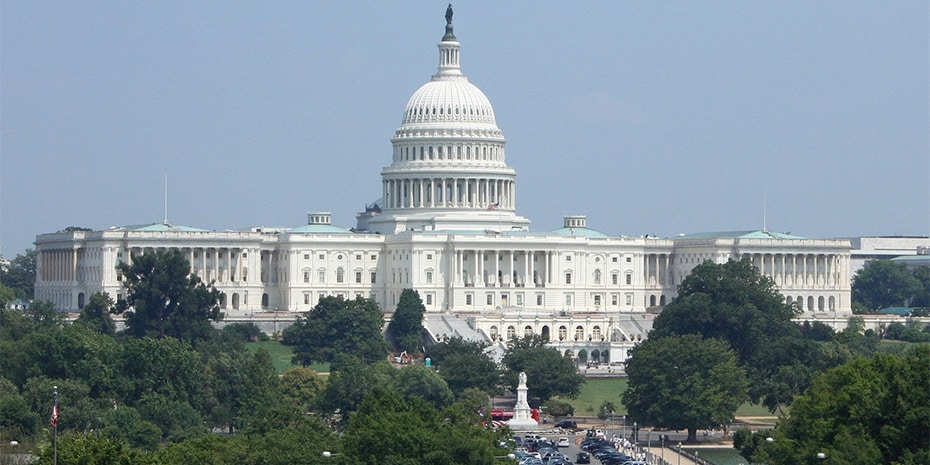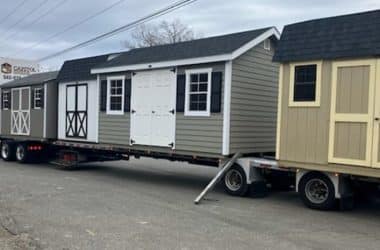
American small businesses, including many businesses in the shed industry, could be staring down a tax rate that will increase to 43.4 percent at the end of 2025 should Congress fail to act, shares the National Federation of Independent Businesses (NFIB).
The 2017 tax cuts, known as the Tax Cuts and Jobs Act, provided a 20 percent small business deduction, known as Section 199A, that set smaller businesses on a level playing field with larger corporations.
As a result, small business investment in their communities and the creation of new jobs powered an economic boom under President Trump.
The looming expiration of this deduction threatens to roll back the clock, forcing business owners already burdened by the worst price spikes and interest rates in a generation, according to NFIB, to consider which employees to lay off or facilities to close to pay higher taxes.
“What’s clear is every single quintile of taxpayer, whether you’re in the lowest or you’re in the highest, is saving money under the Tax Cut and Jobs Act,” shared Toby Mathis, attorney, author, and managing partner and president of Anderson Business Advisors, during the NFIB webinar “Small Business Tax Planning for 2025—Essential Deductions and Savings Strategies.”
“So, there’s a strong argument that those provisions should be extended…. Some of these, I hope they expire. Some of these, I hope that they continue.”
Ways and Means Committee Chairman Jason Smith (MO-08) released the following statement:
“Small businesses in every district and state will pay higher taxes if the Trump tax cuts expire. Republican small business tax cuts set the stage for Main Street businesses to hire new employees, boost paychecks, build new facilities, and contribute to the greatest economy in my lifetime.
“Small businesses have repeatedly told Ways and Means Tax Teams that high prices and interest rates of the Biden-Harris Administration have made running a business unaffordable and they need relief.
“Just look at the facts. In the last year, businesses with the fewest employees have been forced to cut nearly 50,000 jobs. Higher taxes are clearly the last thing these businesses need.”
CONVERSATIONS AROUND THE COUNTRY
The Main Street Tax Team led by Rep. Lloyd Smucker (PA-11) and Ways and Means Republicans have traversed the country to listen to the concerns and priorities of small businesses ahead of the 2025 tax cliff, NFIB shares.
Collectively, Ways and Means Tax Teams have traveled to 20 states to hold over 120 listening sessions with American workers and job creators.
Regardless of industry or state, small businesses are sending the same message: they will not recover from the Biden-Harris Administration’s failed policies if they are forced to pay more in taxes to Washington.
During Ways and Means hearings inside and outside Washington, small business owners have told Congress the negative impact the expiration of the 20 percent deduction would have on their businesses.
At a hearing in Erie, Pennsylvania, Tom Tredway from a Pennsylvania family-owned manufacturer said, “When the 20 percent pass-through deduction expires at the end of 2025, and the individual tax rates increase, our tax bill will be significantly higher. Many small manufacturers are organized as pass-throughs, so our sector will be disproportionately harmed by the expiration of this deduction, severely hampering our growth trajectory.”
At the Iowa State Fair, Rep. Claudia Tenney (NY-24), shared, “Most of the businesses, as Ms. Pol said, in our communities are driven by small business owners, including our farmers. And so, we are just grateful to all of you for putting it in your words exactly what the catastrophic results could be if we don’t continue with these issues… But you talked about 199A, if it should expire, could you tell me just briefly what the operational changes you would have to make in the business if that were to happen?”
Lana Pol, an Iowa small business owner, replied, “Currently, I think what we would do is stop investing, you know. We wouldn’t be able to expense the equipment, you know. We wouldn’t have the extra money to reinvest into our employees and anything else that we wanted to pursue.”
During a hearing in Washington, D.C., Rep. Lloyd Smucker (PA-11) asked, “Mr. Ervin, I know you mentioned this, but could you expand on how a 43.4 percent tax rate would potentially impact your business if we do not make 199A permanent?”
Michael Ervin, a West Virginia small business owner, shared, “Simply put ultimately, a ‘closed’ sign would go up in my window, and not only in my window, but on the windows of most of the other businesses on my street if we had to pay that.”
Ways and Means Republicans are also talking directly with small businesses to hear and see the effects of the potential expiration of the 199A small business deduction. For many communities, these businesses employ the majority of private sector workers and are the heartbeat of their local economy.
Rep. Beth Van Duyne (TX-24), a member of the Main Street Tax Team, held a site visit and roundtable at Republic National Distributing Company with a variety of businesses including roofers, electrical contractors, property managers, and others.
Rep. David Kustoff (TN-08) held a roundtable discussion with local small businesses, including wine and spirits wholesalers, contractors, and barbershop owners. Similar businesses that also use the 20 percent deduction employ 61 percent of workers in the district.
Rep. Kevin Hern (OK-01) held a roundtable with 25 small businesses from various industries. A theme of the listening session was how the 20 percent deduction has served as a lifeline for businesses struggling after four years of failed Biden-Harris policies.
Rep. Greg Murphy (NC-03) hosted a roundtable with small businesses like distribution and farming, to hear how the Trump tax cuts benefited them. 70 percent of private sector workers in this district are employed by small businesses while corporations employ less than 10 percent.
MORE TAX CHANGES TO WATCH
NFIB says there are more policies from the 2017 tax cuts that could affect small businesses and individuals if they expire.
“Congress must act as soon as possible to protect America’s workers, families, farmers, and small businesses from the threat of higher taxes,” Smith says.
“If we actually want our economy to perform as it did before the pandemic, we need to immediately let small businesses do what they do best—innovate, grow, and hire, and they can’t do that with the threat of a massive tax increase over their head.”
NFIB says the following are some key policies from the 2017 tax cuts set to expire if Congress fails to act:
• Congress only has 149 legislative days next year to act before the tax cuts expire.
• The average taxpayer would see a 22 percent tax hike if the tax cuts expire.
• A family of four making $80,610, the median income in the United States, would see a $1,695 tax increase if the tax cuts expire. This is worth about 9 weeks of groceries to a typical family of four across the country.
• 40 million families would see their household’s Child Tax Credit cut in half.
• 91 percent of all taxpayers would see their guaranteed deduction slashed in half.
• 7 million taxpayers would be impacted by the return of the Alternative Minimum Tax.
• 2 million family-owned farms would have their Death Tax Exemption slashed in half next year.
Another possible tax change with the incoming administration could involve tax relief.
“Whether you love (Trump) or hate him, the fact of the matter is that he’s very staunchly, pro-taxpayer, and one of the things that you see a lot of rhetoric around and a lot of misunderstanding around is the throwing around of tariffs,” Mathis says.
“Tariffs are a tax, and so when you hear Donald Trump say I want to impose a 100 percent tariff on somebody. What he’s saying is that the importer is going to have to double whatever they’re buying it for, and then the consumer is going to end up paying significantly more. But the portion that’s the double up, the tariff, goes into the government’s coffers as revenue. That is a tax, and so I always say to anybody who ever listens to me that a tariff is a tax and it’s a sales tax in disguise.
“What it tells me is that we might be heading toward a national sales tax or perhaps a flat tax. You’re going to hear about both. I don’t know if we have enough support to get those through, but it would be great for us as small business owners.
“I think it would end up being a big positive because right now I think the IRC, the code of federal regulations that has to do with the IRS, is many thousands of pages. The interpretation of the laws is millions of pages. It’s just a bear. It would really be nice to see some tax relief.”
ON A POSITIVE NOTE
NFIB President Brad Close joined Bloomberg: The Close to discuss November’s surge in the Small Business Optimism Index, which rose above the 50-year average for the first time since 2021.
Close highlights the factors leading to an increase in optimism among main street owners, such as expectations for new leadership that promises small business-friendly legislation and regulation that will lead to strong economic growth.
“In a nutshell, economic policy matters, and there’s no doubt that the election results spurred a lot of the optimism, that surge in optimism, that we saw in our monthly economic survey,” Close shares.
“Small business owners are looking forward to an administration coming in that’s going to address the concerns that the little guys—half the economy in America—really cares about and that’s tax policy, that’s cutting regulations and getting the economy going again.”
“If you look at one of the biggest issues that small business owners are concerned about, the Small Business Deduction, their ability to deduct 20 percent of their small business income on their business taxes, that’s huge. That was created in 2017, so the economy took off after that tax bill went through.
“That policy expires in a year. Small business owners know that, and they are very optimistic that the incoming administration, which has said that they want to extend and make that provision permanent, is ready to get started on that.”
“When you look at NFIB, our typical member is five to 10 employees which is very reflective of the small business market across the country. So, we’re talking really small businesses all over the country. They tend to come more slowly out of bad economic times and certainly the last three to four years have been very hard on that half of the economy, the small business side.
“But when you look at the optimism that you saw, I think that is a significant precursor of what we’re going to see over the next six months.”
(Note: This article is informational only. It’s not intended to be advice on tax and business planning. Please consult your business planner/tax advisor for advice on your specific shed business circumstances.)




